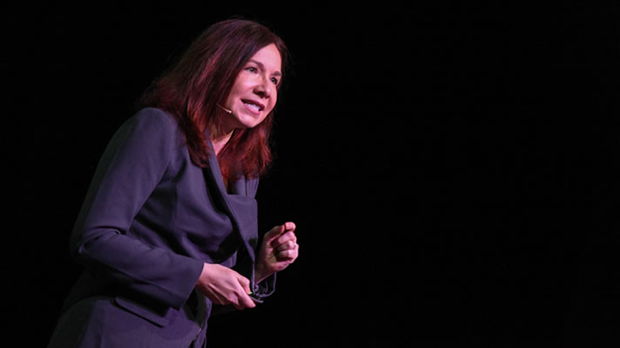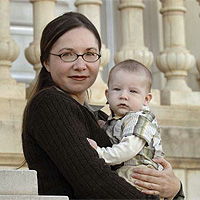Last time we talked, you promised to tell us about how you have navigated travel in your career while being a mother. So many women in our audience feel compromised, especially when they go to conferences or on trips. You’ve done some interesting things to accommodate your career trips and motherhood.
Yes. Having a family is hard. Having a dual-career family is even harder. And the reality is that the more kids we have, the harder it is. One is very portable, two are manageable, three becomes more challenging, and four...[laughs] well, with four you have to consider that at least one person’s career has to be full-time parenthood for a while. So it really depends on the choices we make.
The most important thing I would say is that there's no right choice. The right choice is whatever's right for you. For me, being a mother is incredibly important, but being a scientist, especially studying an issue like climate change that affects us all over the world, that's really important to me, too. And that was one of several factors that played into our choice to have fewer, rather than more, children.
At the same time, I think family size is a choice that we should try to make as consciously as possible, not based on pressure or doubt from what we think society or our community (including our Christian community) might expect of us. In certain Christian circles, there’s more pressure towards having many children, while in other secular circles, it can be exactly the opposite.
That is a really interesting issue. The apostle Paul says, "I have the right to take along a believing wife," but he chose not to exercise that right, because he knew that he could get more done without a wife and a family. On the other hand, with a life partner you can achieve things together that you couldn’t alone. It’s important to have that support and recognize that there is more to this amazing partnership that God has designed for us than solely producing children.
Children can certainly be an important aspect of a marriage, but I don't think it's necessarily a necessary part. Children are a very personal choice that each one of us needs to make, depending on how we feel God is leading us.
At what point in your career did you have Gavin?
When we got married in our late twenties, we agreed that we did not want to have children for at least five or six years. At the time, I was already working as a professor, but I finished my PhD after he was born. Very fortunately, we were able to have a child when we wanted to have one. It was one of those cases where [laughs] we were thinking, "Should we maybe?" And then boom, it just happened.
You mentioned you took your baby with you early on to conferences and on trips.
Yes. When he was about two months old, I went on my first overnight trip to Chicago — without him. I had been leading the climate impact assessment for the city of Chicago for several years and this was the final meeting, the culmination of years' worth of work. How could I not present my own work at this meeting? So I left him with my mother and went to Chicago. One overnight, just one overnight, I thought: it will be okay. I took the breast pump with me. And it was a miserable experience: sleep deprived, still coping with some horrendous health issues and surgeries that had followed the baby, just trying to find a place in the airport where I could pump, taking milk through security. It’s more accepted now, but back then they were like, "What is this? I don't know if you're allowed to take this through," and that was when I lost it. I have a vague memory of screaming something along the lines of, "I squeezed every single ounce from my body! And you are not going to take it!" in the TSA line. It was ridiculous. So after that I just said, I'm taking him with me, I don't know how it's going to work, but that's what we're going to do.
I was very fortunate to have family who could help. The first couple of times, when he was little, my mom or sister would come. And then, when he was a bit bigger, I got braver. I started to ask whatever colleague had invited me, "Do you have a babysitter who you would recommend? Because I'm bringing my son with me. I'm fully committed to all of the meetings and events that we have planned, but I would like to have a local babysitter who could take care of him while we're in our meetings."
Every single time I did that, people were surprised, but they all said, "Oh! Well, I'm sure we could find somebody." And they did. Sometimes it was a graduate student who’d volunteer; sometimes it was somebody's spouse; sometimes they already had a babysitter for their own children, or they knew somebody else who had a babysitter. But every single time, I got a positive response.
There is a little bit of fear in leaving your precious child with a stranger. But by always having someone I knew vouching for the sitter, it worked out.
So, no Craig's List babysitters.
No, no Craig's List babysitters. Also, making sure that we got on Skype ahead of time with them for a face-to-face conversation. And I always arranged for an hour or two at the beginning for us to be with them before taking off. Sometimes that means that I have to start breakfast at seven in the morning, and the person has to come and have breakfast with us. But I always do that to make sure there is that transition period. And then I am able to go off on my day.
I ask the sitter to text me throughout the day, send me pictures of what they were doing. If I have an hour off for lunch, they sometimes come and have lunch with me. And then in the evening, if I am giving a talk, the babysitter brings him or they could put him to bed. Or sometimes my colleagues would have small children, and he would be able to play with them.
It's worked out, by being willing to take those risks. But it's hard as a woman to do that, because so often, as professional women, we already struggle with impostor syndrome, with feeling like we have to prove ourselves. We often feel like nobody can guess that I have a life, that I have children, because they would immediately pigeon-hole me as not being serious. When somebody invites you to give a seminar at another university, and you're a woman early in your career, you want to seem as professional and pulled-together as possible. But I decided that it wasn't worth the price, the price being leaving my child at home all the time. And I feel like it's made people see me as more human. The negative effects have been only a fraction of the positive effects.

Photo credit: Allison Terry
Actually, it seems to me when you are clear about what you need and state it confidently you actually seem to be in a position of some power.
I think that can be true. One example: I was invited to be a mentor at a week long NSF workshop. (I’m fine traveling for up to three days without my son now that he’s older, eight, and he has his own life in school and with friends, but I don't do longer than three days.) So I said, "Well, it's a week long, so I'll have to bring my son with me." And the director of the workshop, who has twins the same age as my son (although I didn’t know that at the time) said, "You can't do that. We don't allow any children." So I said, "Oh, I'm really sorry. I won't be able to come." And that completely took him aback. You could tell that nobody had ever said that before.
About a week later, I got a phone call from him. And he said, rather ungraciously, "Well, we talked about it with the team. And this is a very unusual request. We've been running this program for eight years, and we have never had anybody say this to us before. But we talked about it, and if you can get your own sitter, and if you can promise to be fully engaged in the workshop from eight a.m. to five p.m. with no sign of your child there, then we are willing to accept these terms."
What did you do?
So I said, "Well, I can probably do that. Let me see." So I knew another woman who was going, and she had been going for many years, and she had a son two years older than mine, who had never been allowed to come. So I emailed her, "Do you think maybe your son would be able to come and we might be able to find a joint sitter for both of them?" She said, "I bet we could." And we did. By sharing a sitter, I could afford it.
In that case, we did not know anybody around there who we could ask. But there were two kids, and both were old enough to fully express themselves if there was a problem. So we got on Sitter City, and we found four options for babysitters. We asked them for references, we called their references, and we interviewed them, both of us together, and one turned out to be perfect: a woman who grew up at the camp where the workshop was being held, and who was able to provide her pastor as one of her references. The only reason she was available was because she was supposed to go to Antarctica with the National Science Foundation as part of her Masters degree but there had been a government shut-down, and all of the programs got delayed by a few weeks.
We hired her, and we asked her to develop a schedule for the week and share it with us in advance. Every day, she would come and have breakfast with us and the kids before they headed off, then she would text us throughout the day telling us what they were doing.
The boys had a great time, we had a great time, and at the end of the workshop, the man who had originally said, "Oh, no, you can't bring them," kind of sidled up to me and said, "You know, I wasn't sure how this was going to work, but I think it was okay." I took that as highest praise.
So that is the most pushback that you've had.
Yes!
In the early days, you had a sitter come into the hotel, right? Or wherever you were?
Yes. And when he was littler, I had to make sure that I only had meetings or commitments for at most two hours at a time before I could take an hour's break, especially when I was nursing.
I wasn't able to be nearly as productive, work-wise. I would say my productivity back then was about half what it would be if I was by myself. But my emotional productivity was ten times more than it would've been if I had left him at home.
What changes have you seen in the eight years since you started this?
In the last eight years, there has been a huge revolution in terms of the level of childcare provided at scientific meetings, and in terms of people’s attitudes about bringing your children along. For example, this past summer, I was invited to go to a week-long workshop at the Aspen Global Change Institute, so I said, "Well, I have to bring my son." And the organizer, a man, was wonderful. He immediately said, "Oh! There are these fantastic camps he could do! I'll send you the information. They're wonderful!"
I signed him up for an outdoor hiking camp and once some of my colleagues found out, they started to ask, "What's this camp? What are they doing?! I'll have to bring my kids next year!"
So...more often than not, other colleagues’ response has been, "Wow, you can do that?" And I feel like it's empowered them to be able to do it themselves.
Do you see colleagues doing this with a couple of children? Friends who take two or more children with them when they travel to meetings?
I've seen two, but for three, it usually has to be both parents. And of course that works better if both parents are in the same field.
I remember you mentioning when we last talked that you had items or props that you would bring with you that helped you when Gavin was young? I remember you mentioning a certain stroller.
Yes, I definitely had my toolbox.
I spent a lot of time looking for the stroller that you could flip open with a flick of your wrist, open and shut with one hand, because usually I was by myself.
Also, a sound machine. I trained my son from a baby to sleep with a sound machine and with his favorite stuffed animal so it didn't matter to him where he slept. Until he was about five, we would make up a “nest” for him on the floor of closets in the hotel room. We made “nests” on the floor of an airplane (not while taking off, of course), in the back of the car, sometimes even in a conference room at a university. As long as he had his one stuffed animal and his sound machine, which was really important because it established the same audible environment for him, he was fine.
Now that he’s older, our tools are very much what he needs to take with him to do. So, his pack of homework, whatever he needs to record whatever cool things he’s doing, whether it's taking pictures or his sketching journal. And the iPad, of course, too. The iPad's fantastic because much of his math and science gets integrated into apps. And so he can keep practicing what he's doing at school with the apps he has on his iPad.

For your part, I would think that you probably get to more fun things because you have someone to share them with, rather than, "You know, should I go to the zoo here? I know it's a cool zoo, but..." You have your son and it must be like, "Yeah! Definitely we'll go to the zoo."
Yes, for sure: in fact, we recently had a wonderful tour of the Assiniboine Zoo in Winnipeg, where they have the largest polar bear habitat in the world, because he was coming with me on a trip to Hudson’s Bay with Polar Bears International.
When he was a baby, the benefits of taking him with me were first of all, for my own personal emotional benefit, and for him, having that consistency of always being with me. But now that he's older, I think the benefits of taking him are, for me, I get to share the fun with him. I travel to so many fun places, and I love seeing things, and he does, too. He gets upset when he gets left at home because he feels like he's missing out on a wonderful treat.
Does Gavin ever say, "No, I don't really want to go on this trip"? The trips sound great, but is he getting to the age where he might want to stay home?
Not yet, but I'm sure he will get to that stage. So we’ll definitely be playing it by ear. But you know, if your children want to be with you, you want them along!
When we get to the end of our life, we are always going to have regrets. But I decided that I did not want any of my regrets to be that I didn't spend enough time with my child. I have plenty of regrets already: I feel like there's twenty papers I could have published, or ten research grants that I could have gotten if I'd worked harder. There are definitely regrets that we all have. We all feel like we've dropped balls along the way. But I do not feel like I have dropped the ball of being able to spend time with my son and my family.
Thank you so much, Katharine! We look forward to hearing from you again!
 In our previous interview with Katharine Hayhoe, the topic of taking children along to academic conferences came up. Katharine described her own commitment to bringing her son with her as much as possible and promised she would share more in a future interview. We're happy to offer that conversation here.
In our previous interview with Katharine Hayhoe, the topic of taking children along to academic conferences came up. Katharine described her own commitment to bringing her son with her as much as possible and promised she would share more in a future interview. We're happy to offer that conversation here.




